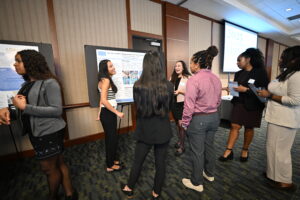Auburn University and the UAB School of Optometry Join ASF Beginning in 2022
Birmingham, AL, November 1, 2021 —–Today, the Albert Schweitzer Fellowship of Alabama (ASFA) announced two new additions to its Academic Consortium—Auburn University and the University of Alabama at Birmingham (UAB) School of Optometry. These institutions join a collaborative of seven other universities and schools, now including:
- Auburn University;
- Samford University, College of Health Sciences;
- UAB School of Dentistry;
- UAB School of Health Professions;
- UAB Heersink School of Medicine;
- UAB School of Nursing;
- UAB School of Optometry;
- UAB School of Public Health; and
- University of Montevallo.
While each school comes with a variety of existing community partnerships, the Consortium leverages their common purpose of equipping graduates with relevant skills and a commitment to address the healthcare needs of the most vulnerable citizens in the state of Alabama. “The UAB School of Optometry has a long and strong commitment to serving local, state, regional and global communities in need, so a partnership with ASF is a welcome addition to our outreach efforts,” said Dr. Kelly Nichols, Dean of the UAB School of Optometry. “I look forward to our doctor of optometry and vision science program graduate students becoming Fellows, and carrying their passion for outreach forward. The positive lessons learned from this experience will stay with them throughout their lives, continuing Dr. Albert Schweitzer’s legacy.”
Dr. Hollie Cost, Assistant Vice President of University Outreach at Auburn University, echoed similar sentiments regarding Auburn’s involvement. “As the Outreach division of Auburn University, a prominent land-grant institution, we are wholly committed to creating pathways for our students to fully engage with the community in innovative and impactful ways,” Cost said. “The Albert Schweitzer Fellowship Consortium provides graduate students across disciplines with immediate opportunities to apply their academic training to address health disparities across our communities. Upon programmatic completion, graduates of ASF become “Fellows for Life”, launching a lifetime of national networking within their discipline and beyond.”
Students from the Consortium schools are invited to apply to the Fellowship each year. Once selected, Fellows complete a 13-month, structured experience geared towards leadership as well as personal and professional development utilizing experiential learning and reflection. Ultimately, Fellows seek to identify and address health inequities. Working alone or with a partner, Fellows commit 200 hours to serve alongside a community organization to plan, implement, and evaluate a project that meets an unmet need or builds upon the assets of a community. Fellowship projects can vary year-to-year but oftentimes address access to healthcare, developing the potential of youth, increasing social supports, alleviating food insecurity and improving nutrition. “Health is considered to be complete physical, mental and social well-being, not just the absence of disease. Unfortunately, data shows us that people—particularly in Alabama–don’t have equal opportunities to achieve health. The question is, ‘Why? And what are we going to do about it?’ I’m thrilled to partner with these schools who commit to both academic excellence and health equity. With their partnership, we can equip the future leaders that our state needs and deserves,” said Kristin Boggs, ASF of Alabama Executive Director.
The Albert Schweitzer Fellowship of Alabama has graduated 71 alumni with another 13 in the current 2021-22 cohort. The addition of Auburn University and the UAB School of Optometry will allow ASF of Alabama to accept more students for the 2022-23 cohort, anticipating a group of 17-20. “This is an exciting time in the history of our organization, as it reflects a growing commitment from our academic partners to work across institutions to best serve the community,” said Brooke Bowles, ASF of Alabama President. “On behalf of the Board of Directors, I want to thank these academic leaders for entrusting ASF of Alabama to be one additional vehicle for their community engagement efforts.”
For more information about how to apply or support the work, please visit www.asfalabama.org.
###
About The Albert Schweitzer Fellowship of Alabama
The Albert Schweitzer Fellowship (ASF) of Alabama is preparing the next generation of professionals who will serve and empower vulnerable people to live healthier lives and create healthier communities in Alabama. To date, 84 Alabama Fellows have contributed over 15,000 hours of service at a value of over $362,000. Nationally, more than 4,000 U.S Schweitzer Fellows have delivered nearly 750,000 hours of service to individuals and communities in need. Additionally, over 100 Lambaréné Schweitzer Fellows have served in Africa at the Schweitzer Hospital in Lambaréné, Gabon. Through this work and through the ongoing contributions of the more than 4,000 program alumni who continue as Schweitzer “Fellows for Life”, ASF perpetuates the legacy and philosophy of physician-humanitarian and Nobel Peace laureate Dr. Albert Schweitzer. ASF currently has 13 active program locations in the U.S. The national nonprofit is located in Boston, MA.


